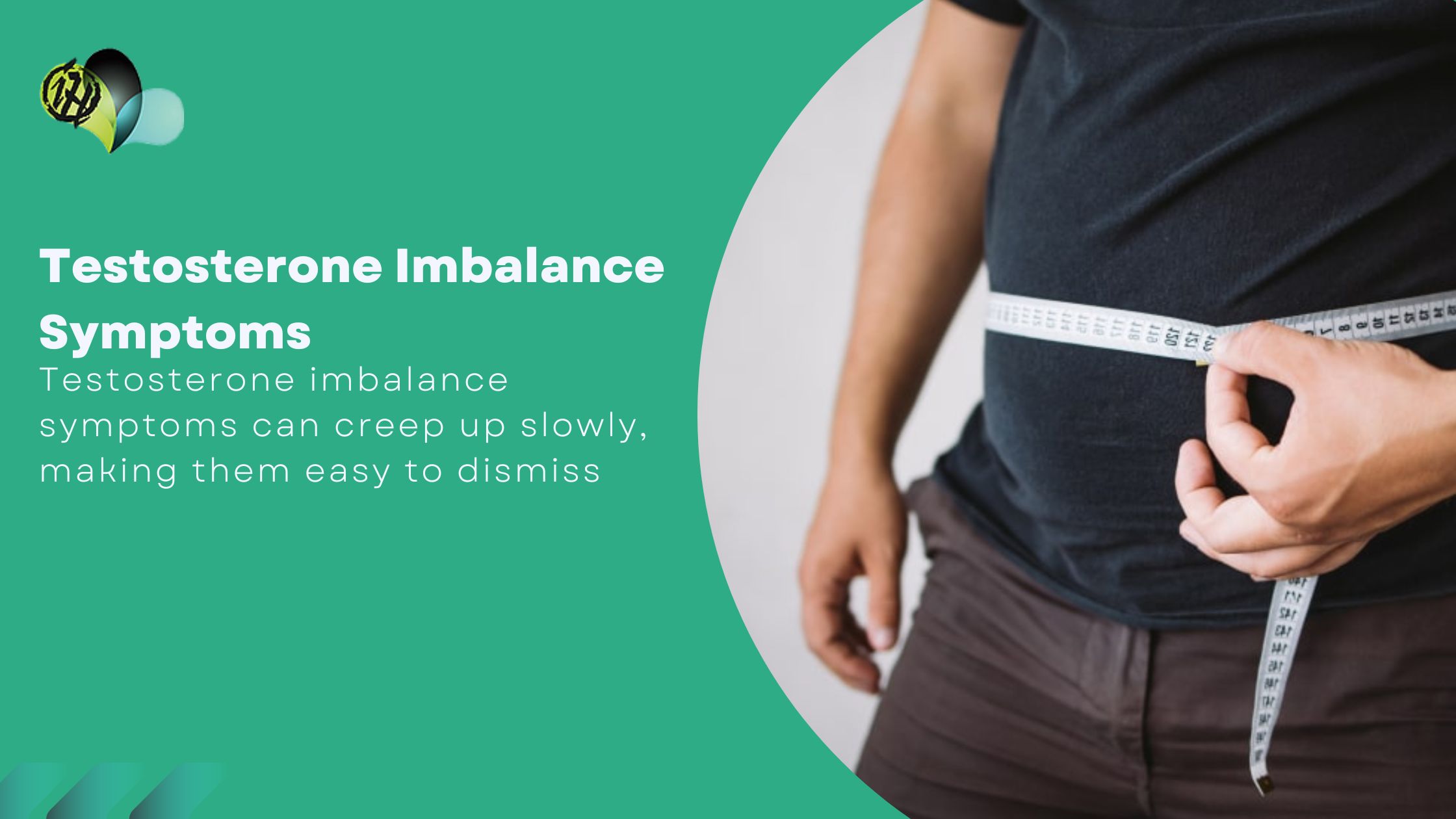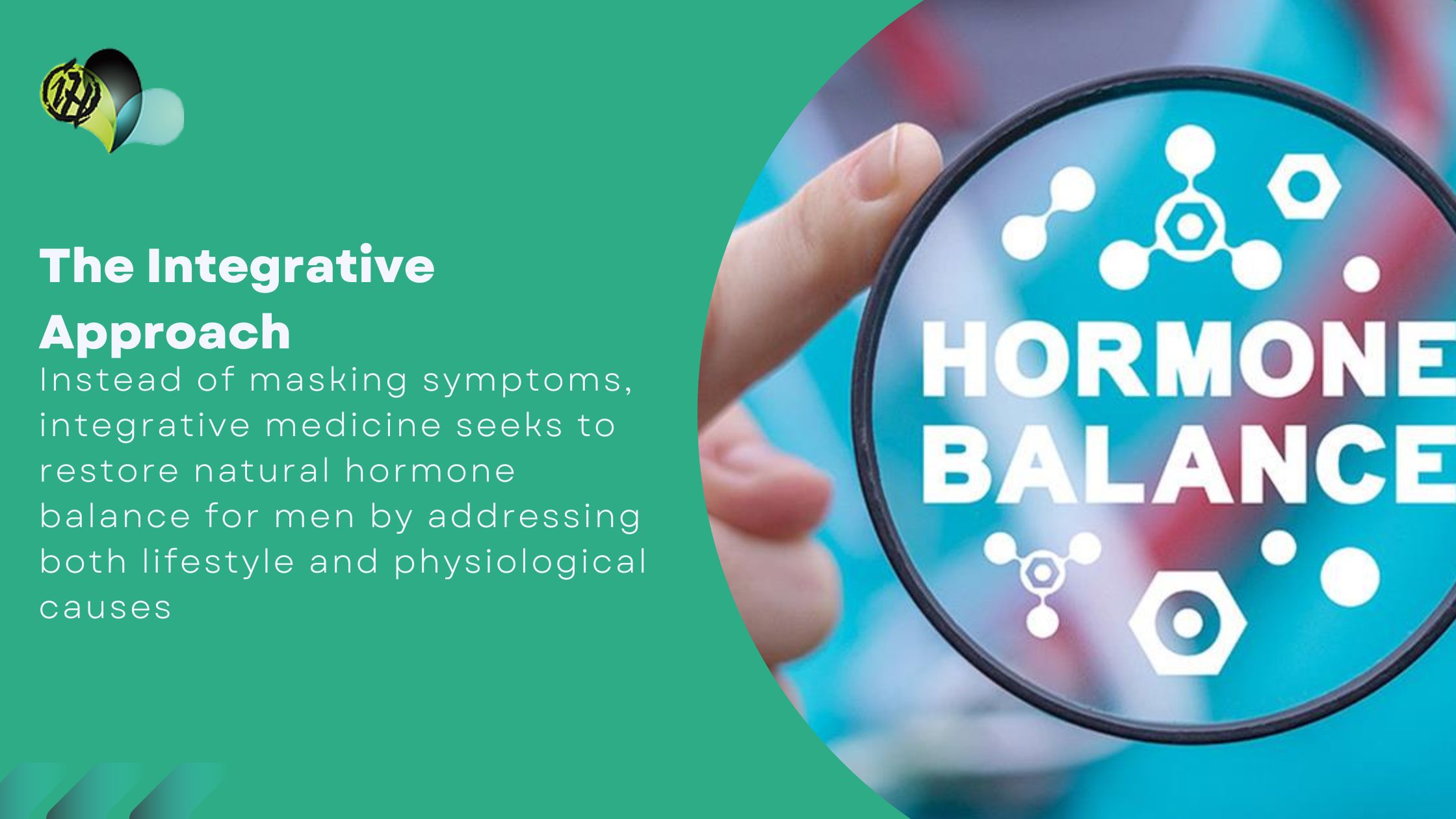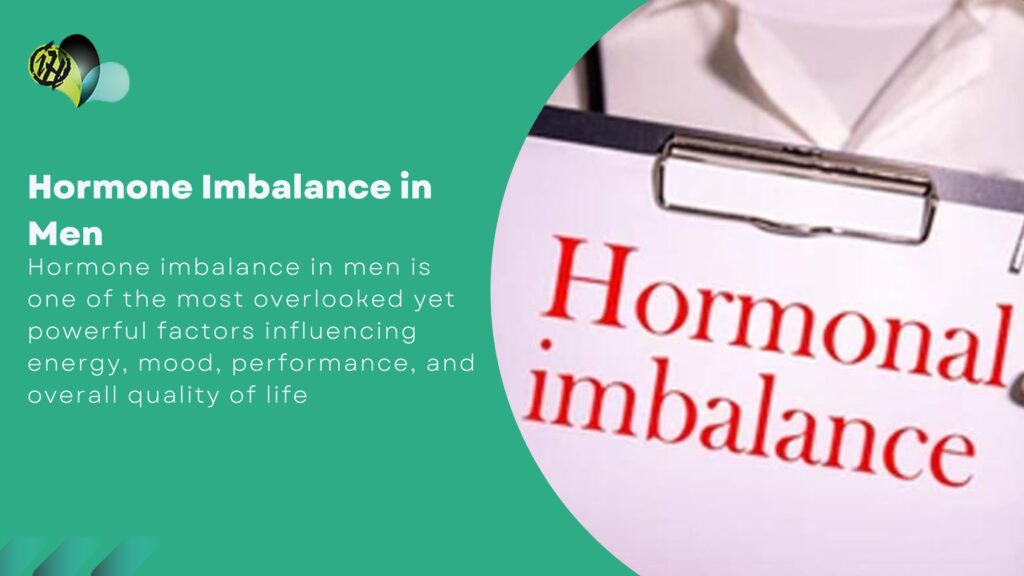Hormone imbalance in men is one of the most overlooked yet powerful factors influencing energy, mood, performance, and overall quality of life. Many men experience symptoms like fatigue, low libido, irritability, and weight gain, and assume they’re just “getting older.” But in reality, these are often signs that the body’s delicate hormonal systems are out of sync.
At Integrative Health Inc., we approach hormone health differently by identifying the root causes of imbalance, restoring harmony naturally, and supporting long-term wellness through integrative care.
Understanding Men’s Hormones and Their Role in Vitality
Hormones are chemical messengers that regulate nearly every bodily function, from metabolism and muscle mass to mood and cognition. In men, testosterone takes center stage, but it’s far from the only player. The thyroid, adrenal, and pituitary glands all contribute to a balanced hormonal network that sustains energy and vitality.
Key Hormones in Men
-
Testosterone: The principal male sex hormone, responsible for libido, muscle mass, bone density, mood regulation, fat distribution, and energy.
-
Free vs. Total Testosterone: Total testosterone measures bound + unbound forms. Free testosterone is the unbound hormone available to tissues—sometimes symptoms align more closely with the free fraction.
-
DHT (dihydrotestosterone): A metabolite of testosterone critical to prostate health, hair growth/loss, and androgenic effects.
-
Estradiol / Estrogen: Men also produce small amounts of estrogen; balance is necessary for bone health, mood, and libido.
-
SHBG (Sex Hormone Binding Globulin): The protein that binds testosterone; high SHBG reduces available free testosterone.
-
Cortisol: The “stress hormone” from the adrenal glands. Elevated or dysregulated cortisol undermines testosterone production and overall endocrine balance.
-
Thyroid Hormones (T3, T4, TSH): Thyroid dysfunction can mimic or aggravate testosterone issues.
-
Others: LH (luteinizing hormone) and FSH (follicle-stimulating hormone) regulate testicular activity. Insulin, leptin, growth hormone, and IGF-1 also influence hormonal equilibrium.
These hormones communicate in feedback loops and networks. A deficiency, excess, or imbalance in one can ripple across others. Thus, integrative care attempts to view the endocrine system as an interconnected orchestra of isolated soloists.
Testosterone Imbalance Symptoms: Recognizing the Early Signs

Testosterone imbalance symptoms can creep up slowly, making them easy to dismiss. However, early recognition helps prevent long-term decline.
Physical Symptoms
-
Reduced libido and sexual function (erectile dysfunction, decreased morning erections)
-
Fatigue and low energy despite “adequate rest”
-
Muscle loss/weakness and difficulty building or preserving lean mass
-
Increased body fat, especially abdominal fat or “belly fat”
-
Gynecomastia/breast tenderness
-
Hair thinning or loss (especially in androgen-sensitive areas)
-
Hot flashes/night sweats (less common in men, but possible in dramatic hormonal shifts)
-
Bone mineral density loss/osteoporosis risk
-
Metabolic changes: higher cholesterol, insulin resistance, or type 2 diabetes
-
Sleep disturbances (insomnia, fragmented sleep, sleep apnea)
Emotional / Cognitive / Psychological Symptoms
-
Irritability, mood swings, or increased anxiety
-
Depression or low mood
-
Difficulty concentrating or “brain fog”
-
Low motivation/goal drive
-
Memory lapses
Other Systemic or Less Obvious Signs
If these testosterone imbalance symptoms sound familiar, it’s time to consider testing your hormone levels and addressing the imbalance before it worsens.
The Hidden Causes of Hormonal Changes in Men
Hormonal changes in men are influenced by a wide variety of lifestyle, environmental, and biological factors. Understanding these causes is crucial to developing effective and lasting solutions.
1. Aging and Natural Decline
After age 30, testosterone levels gradually decline by about 1% per year. However, lifestyle choices can accelerate or slow this process.
2. Chronic Stress
When the adrenal glands produce too much cortisol, testosterone production decreases. Long-term stress also disrupts sleep, digestion, and immune balance. Chronic Stress
3. Poor Sleep
Testosterone is mainly produced during deep sleep. Sleep deprivation or conditions like sleep apnea can dramatically reduce levels.
4. Nutrient Deficiencies
Low zinc, magnesium, or vitamin D can interfere with testosterone synthesis and metabolism.
5. Environmental Toxins
Endocrine disruptor chemicals found in plastics, pesticides, and cleaning agents mimic or block natural hormones.
6. Weight Gain and Insulin Resistance
Excess fat tissue converts testosterone into estrogen, further reducing hormonal changes in men.
7. Medications and Lifestyle Factors
Certain prescription drugs, alcohol, and lack of physical activity can all suppress hormone production.
These influences often overlap, which is why an integrative approach targeting multiple systems tends to be more effective than a single intervention.
The Integrative Approach: Restoring Natural Hormone Balance for Men

Instead of masking symptoms, integrative medicine seeks to restore natural hormone balance for men by addressing both lifestyle and physiological causes.
Nutrition for Hormone Support
- Eat clean proteins and healthy fats: Eggs, avocados, nuts, and wild-caught fish provide building blocks for testosterone.
- Increase cruciferous vegetables: Broccoli, kale, and cauliflower support estrogen metabolism.
- Avoid processed foods and sugars: They promote inflammation and hormonal resistance.
- Stay hydrated and reduce alcohol: Dehydration and alcohol can both lower testosterone.
Exercise and Physical Vitality
Strength training, especially compound movements like squats and deadlifts, naturally boosts testosterone. Short bursts of high-intensity interval training (HIIT) can also improve metabolism and hormonal function.
Sleep and Recovery
Quality sleep is non-negotiable. Aim for 7–9 hours per night with a consistent bedtime, limited blue-light exposure, and stress management before bed.
Stress Management
Mindfulness, meditation, and deep breathing help lower cortisol, allowing testosterone to recover. Chronic stress is one of the biggest threats to endocrine health in men.
Detox and Environmental Awareness
Reducing exposure to plastics, chemical-laden personal care products, and pesticides lowers the body’s toxin burden, allowing hormones to rebalance naturally.
Low Testosterone Treatment: Safe and Personalized Options
When natural methods alone don’t fully restore balance, low testosterone treatment may be considered under medical supervision. Integrative Health Inc. uses evidence-based, personalized therapy options that prioritize safety and sustainability.
Bioidentical Testosterone Therapy
Bioidentical testosterone matches the body’s natural hormone structure, minimizing side effects. It can be delivered through:
- Injections
- Transdermal creams or gels
- Pellets placed under the skin
Adjunct Therapies
To maintain fertility and prevent over-suppression, some men use supportive medications such as:
- Clomiphene citrate (Clomid): Stimulates natural testosterone production.
- hCG: Preserves sperm production and testicular volume.
- Aromatase inhibitors: Control excess estrogen conversion.
Comprehensive Monitoring
Hormone therapy isn’t a one-time fix; it requires ongoing evaluation of:
- Hormone levels (testosterone, estrogen, DHEA, cortisol)
- Blood count (hematocrit)
- Prostate and cardiovascular markers
- Mood and overall wellness
The goal isn’t just to raise testosterone, it’s to optimize men’s health and hormones as a complete system.
Hormone Optimization for Men: Beyond Numbers
Many men discover that lab numbers alone don’t define how they feel. True hormone optimization for men means achieving the right hormonal balance for both the body and the mind.
Key Elements of Optimization
- Individualized Dosing: Each man’s needs are unique dosage and delivery methods are adjusted for optimal results.
- Root-Cause Focus: Correcting thyroid dysfunction, adrenal fatigue, or nutrient deficiencies alongside testosterone therapy.
- Functional Medicine Integration: Addressing inflammation, gut health, and detox pathways to sustain hormonal health.
- Lifestyle Empowerment: Educating patients to take charge of their wellness through daily habits.
With integrative care, men not only regain energy and libido but also experience better focus, emotional stability, and long-term metabolic resilience.
Structuring an Integrative Protocol: Phases of Care
A phased, adaptive strategy helps patients progress safely and sustainably.
| Phase | Focus | Interventions | Goals |
|---|---|---|---|
| Phase 0 – Stabilization | Address basic lifestyle deficits | Sleep, nutrition, stress reduction, and minimizing toxins | Restore baseline resilience |
| Phase 1 – Root Cause Investigation | Assess lab patterns, genetic influences, detox pathways, and metabolic stress | Comprehensive labs, imaging, functional tests | Clarify drivers of hormonal dysregulation |
| Phase 2 – Supportive Therapy | Use nutraceuticals, adaptogens, detox, mitochondrial support | Supplements, detox, liver support, adaptogens | Create a more favorable hormonal environment |
| Phase 3 – Hormone Optimization | Introduce testosterone or adjunct therapies as needed | Bioidentical hormone therapy, SERMs, hCG, estrogen control | Achieve symptom relief and balance |
| Phase 4 – Monitoring & Adjustments | Regular reassessment and fine-tuning | Lab monitoring, dose adjustments, lifestyle tweaks | Sustain men’s hormone health long-term |
This phased approach ensures that hormone optimization doesn’t occur in a vacuum but is fully integrated with the patient’s whole-person health.
Common Challenges & Safety Considerations
Optimizing men’s hormone health is powerful, but it must be handled responsibly.
-
Erythrocytosis (increased hematocrit): Monitor and adjust dose; consider phlebotomy if needed.
-
Prostate health: Regular PSA, DRE, and urological evaluation are essential.
-
Cardiovascular risk: Monitor lipids, blood pressure, lipoprotein patterns, and insulin sensitivity.
-
Infertility risk: If preserving fertility, avoid high-dose testosterone alone; use hCG or other fertility-supporting protocols.
-
Estrogen excess: Over-suppression or imbalance may cause joint pain, mood issues, or lipid changes.
-
Suppression of endogenous axis: Titration, cycling, or breaks may preserve intrinsic hormonal function.
-
Drug interactions & underlying conditions: Clients with diabetes, heart disease, or cancer histories require tailored oversight.
-
Adherence & psychological expectations: Setting realistic expectations and fostering patience is key.
With a competent integrative provider overseeing care, these risks are manageable, and outcomes can be favorable.
Why Choose Integrative Health Inc for This Service?
When it comes to treating hormone imbalance safely and effectively, Integrative Health Inc stands apart for its patient-centered, holistic model.
1. Whole-Body, Integrative Care
Rather than treating hormone imbalance in isolation, our team addresses all contributing factors, including nutrition, sleep, stress, detoxification, and lifestyle.
2. Expert Team
Our experienced practitioners specialize in functional medicine, hormone optimization, chiropractic care, acupuncture, and nutrition, providing a unified, multi-dimensional plan for men’s health.
3. Personalized Testing and Protocols
We use comprehensive diagnostic panels to evaluate testosterone, thyroid, adrenal, and metabolic function. This ensures each treatment plan is built precisely around your body’s needs.
4. Safety and Supervision
Hormone therapy is monitored through regular lab work, follow-ups, and patient education, ensuring effective results with minimal risks.
5. Empowering Men to Thrive
We don’t just restore hormones, we help men reclaim their confidence, motivation, and sense of vitality. Our mission is to optimize every aspect of health for long-term success.
Choosing Integrative Health Inc means choosing compassionate care rooted in science, a partnership designed to help you feel your best at every stage of life.
Living with Balanced Hormones: Practical Everyday Tips
Restoring hormone balance is not only about treatment, it’s about lifestyle consistency. Here are simple habits to protect your hormones daily:
- Prioritize resistance training: Build muscle, boost metabolism, and support testosterone.
- Get consistent sleep: Deep sleep is when growth hormone and testosterone peak.
- Eat the rainbow: Variety in fruits and vegetables ensures antioxidant and micronutrient support.
- Hydrate and move often: Circulation improves hormone delivery.
- Manage stress proactively: Don’t wait for burnout. Schedule time for mindfulness and hobbies.
- Limit alcohol and smoking: Both reduce testosterone and increase estrogen.
- Check your levels regularly: Annual hormone panels help detect issues early.
Common Myths & Misconceptions
-
Myth: Testosterone therapy is only for “old men.”
Reality: Men of many ages with hormonal dysregulation can benefit, within safe, monitored frameworks. -
Myth: If labs are “within normal,” therapy isn’t needed.
Reality: Lab “reference ranges” are broad population norms; the optimal range for function can be narrower. -
Myth: Bioidentical hormones are unregulated and unsafe.
Reality: At a trusted integrative clinic, bioidentical hormones are administered under rigorous protocols and oversight. -
Myth: Testosterone therapy automatically causes prostate cancer.
Reality: No conclusive evidence supports this. Vigilance and screening are necessary, but blanket avoidance is outdated. -
Myth: Only injections work.
Reality: Various modalities (gels, patches, pellets) exist; the best choice depends on patient preference, absorption, and monitoring. -
Myth: Supplements alone can correct severe hormonal decline.
Reality: Nutraceuticals support physiology but typically cannot replace hormone therapy in moderate-to-severe deficiency.
The Results of Balanced Hormones
When men address hormone imbalance, the transformation can be remarkable:
- Energy returns from workouts feels easier, and recovery is faster.
- Focus improves mental clarity and replaces brain fog.
- Mood lifts confidence and motivation resurface.
- Sleep deepens and stress becomes manageable.
- Physical appearance improves leaner body composition and better vitality.
Hormonal balance supports not just longevity, but a renewed zest for life.
Conclusion
Hormone imbalance in men doesn’t have to be an inevitable part of aging. With integrative assessment, personalized therapies, and sustainable lifestyle strategies, men can restore balance, energy, and well-being at any age.
At Integrative Health Inc., our mission is to guide men through every step of their hormonal journey from discovery to long-term optimization. By combining science, care, and natural healing, we empower every man to thrive with balanced hormones and renewed vitality.
If you’re ready to take control of your men’s health and hormones, schedule your consultation today and start your path toward optimal endocrine health in men, because balanced hormones mean a balanced life.

